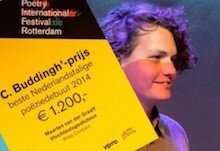
The spirit of Ted Berrigan is alive and well in the Chinese poet Yang Li! He too can be described as “a rather formless, artless, effortless presenter of his ordinary self and his ordinary experience” (Norton Anthology of Modern Poetry). But is crudeness the same as simplicity, and is bald statement really the same thing as directness?
Yang Li was born on 3 August 1962 in the city of Chengdu, Sichuan province. He began writing poetry in 1980 (he won’t explain why: he suggests there can be no explanation) as China began to emerge from its cruel decade of turbulence (the Cultural Revolution). According to his own account of his development as a writer, 1980 was also the year of his first sexual experience, and for Yang Li sexual love and poetry are closely entwined (see his poem ‘My Sex-life Is Wreaking Havoc . . .’), although he generally does this in a predictably masculine fashion (he’s not afraid to boast).
With friends, he established an underground poetry magazine called — unforgettably — The Plague — which seems to have achieved its primary aim: that of achieving notoriety for its founders. It also set the tone for Yang Li’s literary personality: iconoclasm and self-centredness seems to be its dominant notes, with a strong emphasis on the personal.
As an iconoclast, Yang Li rejects any notion of craftmanship. As the piece ‘This Poem Only Took Two Minutes to Write’ spells out, the poet is not interested in effort: what counts is immediacy. For this reason, his work is generally short, the language he employs in his poems tries to recreate spoken language (an illusion, of course), and his themes are succinctly stated rather than elaborated with any intricacy. In this, he is reacting against to the quasi-Romantic lyricism of the early post-Mao period, a poetry that marked a much-needed return to metaphor and private, indirect utterance. He does this, partly perhaps because his personal experience was less marked by the Cultural Revolution, and partly in order to do justice to the realms of everyday life, a realm which poetry often has trouble coming to grips with.
Yang Li’s self-centredness has positive and negative aspects. On the positive side, he has no qualms about sharing his private life with the world: “On winter nights, I’m fond of shitting and pissing outdoors” (‘Pissing’); “I’m fed up with the Industrial and Commercial Bank of China / Beijing branch / Xianghe yuan sub-branch” (‘What I Want’); “I want to write a poem for Tiedan” (‘Poem Written for a Friend’); “I saw a murderer / she looked like a famous beauty” (‘Written for Bloggers’): “what will I do now? / it’s 1.36pm / on 8 August 2004 / and I’ve only been up for an hour” (‘Written for My Blog’); “I must go and find a job / miserable day are just around the corner” (‘Talking to Myself’).
There is courage and a genuine lust for life in this orientation, but there are times where the intimate trivia of the man’s existence merely underwhelms. The question is: does Yang Li’s approach really serve a desire to connect with actual experience? A related question is: does a refusal of metaphor and other poetic devices necessarily ensure objectivity and a better chance of coming to grips with reality?
Living is both simple and complex: Yang Li’s focus on the former is achieved at the expense of the latter, and so misses something essential. A second point: the impression of directness in Yang Li’s poems is created by focussing on experiences familiar to a majority of readers. In other words, the apparent ‘directness’ is better described as ‘familiarity’. It is the lack of interpretation required on the part of the reader which makes the experience seem so accessible and therefore ‘fresh’. By reducing experience to its lowest common denominators, all that is most personal in experience is obliterated.
See what you think, but my guess is that by exposing himself in the way he does, Yang Li manages to hide himself all the more effectively.







